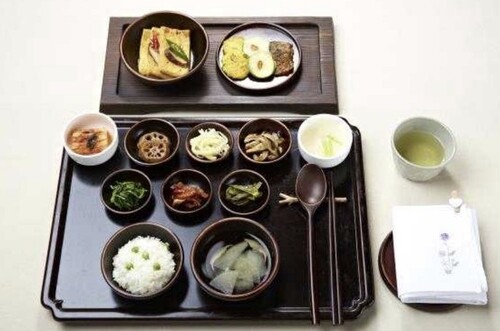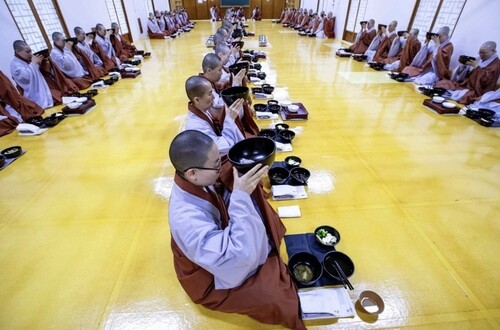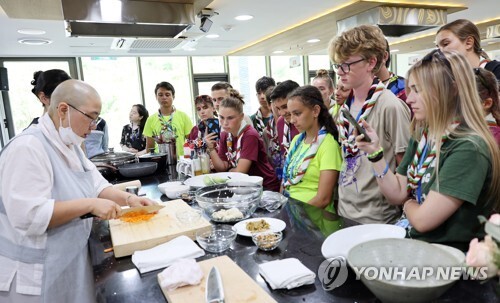 |
| ▲ This photo of Seoul Jingwansa temple cuisine is provided by the Jogye Order of Korean Buddhism office. (PHOTO NOT FOR SALE) (Yonhap) |
SEOUL, March 21 (Yonhap) -- Korean temple cuisine, which embodies Buddhist philosophy by preserving the natural flavors of ingredients, is set to be recognized as a National Intangible Cultural Heritage, state agency announced on Friday.
Temple cuisine refers to Buddhist culinary traditions passed down in temples, encompassing monastic meals and balwoogongyang, a formal way of eating in Buddhist practice. Each temple has its own variations of dishes, but they all share a vegetarian foundation, excluding meat, fish, and five pungent vegetables (garlic, green onions, chives, leeks, and asafetida).
The Korea Heritage Service highlighted that temple cuisine embodies Buddhism’s principle of non-violence (ahimsa) and respect for life, forming a unique food culture rooted in moderation and sustainability. Temple food is particularly distinguished by its use of fermented ingredients and locally sourced produce, setting it apart from similar traditions in other countries.
 |
| ▲ This photo, provided by the Jogye Order of Korean Buddhism office, shows Buddhist monks' "balwoo gongyang." (PHOTO NOT FOR SALE) (Yonhap) |
Temple cuisine has long influenced and been influenced by Korean food culture. Historical texts from the Goryeo Dynasty, such as Dongguk Yisang Gukjip and Jogye Jingak Guksa Eorok, document dishes like vegetarian dumplings and mountain mustard kimchi. During the Joseon Dynasty, temples played a key role in producing fermented foods such as tofu and soybean paste, engaging in food exchanges with the aristocracy.
Today, temple cuisine is gaining international recognition, attracting interest from renowned chefs and food enthusiasts worldwide for its simple yet harmonious flavors.
 |
| ▲ This Yonhap file photo shows foreigners learning temple cuisine recipes. (PHOTO NOT FOR SALE) (Yonhap) |
A representative from the Korea Heritage Service (KHS) stated, “Temple cuisine maintains traditional cooking methods while allowing for creative reinterpretations, contributing to cultural diversity and innovation.” However, due to the wide variety of temple recipes and their collective transmission rather than through specific individuals or organizations, no official holder of the tradition will be designated.
The designation will be finalized after a 30-day review period and deliberation by the Intangible Cultural Heritage Committee.
(C) Yonhap News Agency. All Rights Reserved






















![[인사] 영화진흥위원회](/img/k-vibe-logo.jpg)
